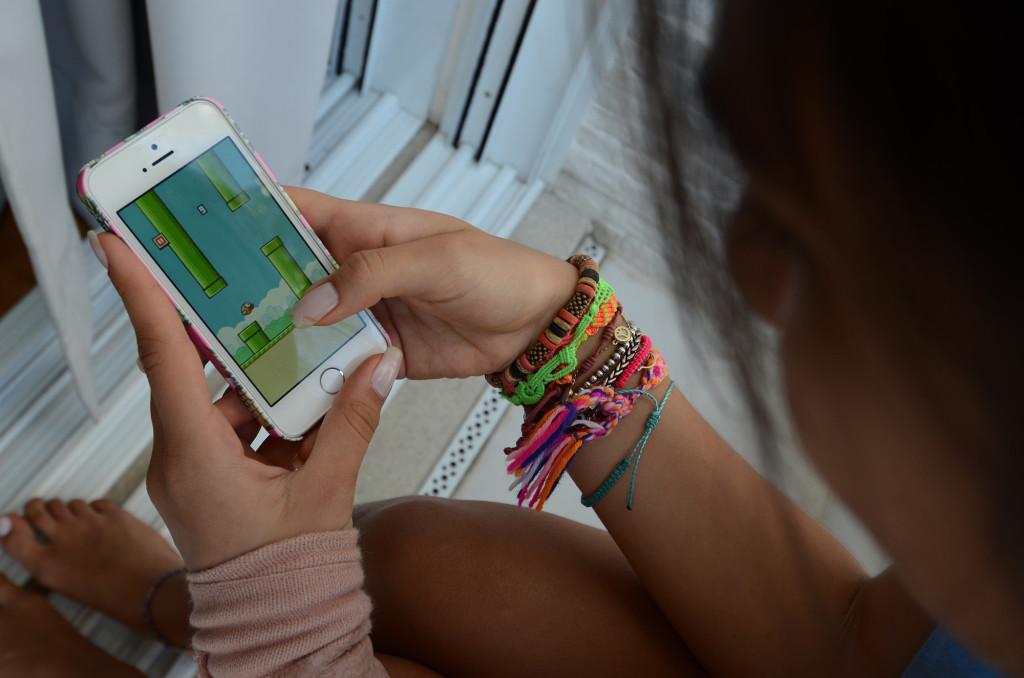Flappy Bird: blessing or curse?
The latest fad in gaming
Update: Dong Nguyen, the creator of Flappy Bird, has announced in a tweet that he will remove the game from the App Store and Google Play Store at 15:00 (1700 GMT), Sunday, 9 February.
Flappy Bird. Yet another bird-themed game has made its nest in the mobile devices of Graded students. Remember Angry Birds? Tiny Wings? Everyone you know is talking about the latest and, once again, you’re the only person who has yet to install it on your phone. Maybe you do have it, in which case you’ve enjoyed it, loved it and then loathed it—that last one especially. One quick Youtube search of “I hate Flappy Bird” produces over 20,000 results.
The premise of the game is simple: control a yellow bird (red or blue in the Android version) by tapping the screen. Each tap propels the bird upwards, and the goal is to fly him (or her?) through a pair of green Mario-esque pipes. Passing through the pipes earns the player a point and crashing into the pipes or falling on the floor ends the game. But don’t let the simplicity of the game fool you. Even achieving a single-digit score can be frustrating. Does anyone know Tanay Agarwal? His all-time record is 7. For Luke Murkowski, it was too much: “It pissed me off, so I deleted it.”
This game is excruciatingly difficult, and yet we play it nonstop. We want to know all the little tips and tricks to beat our high score—Yugo Watanabe’s hint is to look always look at the bottom pipe, so as to know when to tap the screen. Jakob Naegeli shows off his score of 192, but it’s really just a scam; his version of the game moves extremely slowly, making such a score feasible. People who play fairly have much more reasonable scores: Daniel Almeida has scored 16. Melanie De La Paz, 28. My all-time best is 68—I’m so proud of that fact. More than I should be, probably.
The sadist behind this oddly difficult game is Dong Nguyen, a Vietnamese developer from Hanoi. He released the game back in May 2013, but its recent surge in popularity has led to criticism. It’s one of 2014’s most-download apps, but some have accused Dong of using Internet bots to post false reviews on the App Store and Android’s Play Store to boost the game’s popularity. Whether or not these claims are true, there’s no denying that it has become an addiction—after finishing a BSS test, I saw at least half a dozen kids sitting down playing Flappy Bird, a sort of emotional catharsis following the stress of the test.
But how long will Flappy Bird’s popularity last? No one knows. Probably not too long, though. The repetitive nature of the game means that people will get bored of it—and fast. The same happened to other games like Temple Run and Tiny Wings; after a while, people lost interest in running away from scary monsters or hopping along hills. In a few weeks, I predict that we won’t be hearing about Graded students’ difficulty in flying through green pipes. Except maybe for that one lame friend who is always late to the party: “Hey guys! Check out this awesome new game I found! It’s called Flappy…something.”

Kevdawg has been on The Talon staff for three years, slowly climbing up the Entertainment ladder to the editorial position. He is of a generally tepid...

Nicole has been part of The Talon staff for three years, as a photographer and Layout Editor. Her passions include pugs, reading and traveling.









